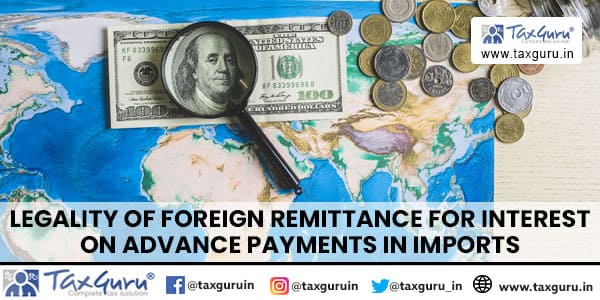Foreign Remittance for Interest on Advance Payments in Imports, whether allowed?
Introduction: Overseas contracts often stipulate remittance of interest on prepayment advances in import transactions, leading to confusion and disputes. This discussion examines the fairness of such demands by overseas sellers and delves into the complexities of contractual terms, shedding light on the ensuing chaos for importers.
There are enabling provisions in some of the Overseas Contracts with Foreign Entities for purchase of Equipment that require the importer to remit interest on prepayment Advances. The Importer is required to pay advance on the purchase cost and the balance payments upon delivery within the specified credit period.
1. Whether remittance of interest on Advances allowed and the ensuing chaos:
Overseas seller demands interest on the Advance payments without understanding the intricacies of the Contractual terms. Many times, the Authorised Banker questions the validity of foreign remittance on account of interest on Advances. Importer is equally confused on such interest demands by the overseas seller. Why should the Importer pay advance on the payment made in advance by him, whether such claims are valid.
Yes, such claims by the overseas seller are unfair and not valid.
2. Let us examine the terms used in a typical overseas contract for purchase of equipment:
A typical contract for import has a undefined terms like this “As the Seller purchases the equipment in advance, the Buyer shall separately pay the interest on the prepayment to the Seller…”
a. Overseas Advance Payment:
It is the amount of advance demanded by the overseas seller once the purchase order is placed by the Importer.
For example the contract may require that, “The Buyer shall pay the seller the advance payment of USD XXX on the subject matter of the contract within 30 days after the signing of the contract, and pay the remaining payment USD XXX within 30 days after the Seller issues the qualified invoice…”

b. Final Payment:
This is the payment required to be made by the importer upon delivery of equipment after the overseas seller issue the qualified invoice
c. Prepayment:
Many times, the Overseas Seller procures the specified equipment immediately upon receipt of purchase order from the importer. It is the actual cost incurred by the seller for procuring the equipment for export pursuant to the request of the buyer.
d. Qualifying Amount for interest (A):
The prepayment made by the Overseas Seller should be adjusted against the advances and any other remittance made by the buyer towards purchase of equipment until the date of final settlement.
e. Interest Rate (B):
The annual interest rate mentioned as agreed in the Contract towards prepayment made by the seller, usually it is the bank rate prevailing in the country of export plus agreed percentage.
f. Interest Period (C):
The intervening period between the date of prepayment and the date of Advance Payment till the date of Final settlement.
g. Interest Payable (D):
As agreed, and in my opinion the interest payable is only for the prepayment made by the Seller to procure the specified equipment required by the Buyer net of all advances and settlement made by the Buyer for the interest period. It is computed as
D= (A*B/12)*C
3. Conclusion:
Interest is not payable on the advance remittance made to the overseas seller for procurement of equipment, as demanded generally by the seller. It is payable only on the prepayment cost as explained above. In most of the contracts with the overseas seller the term prepayment is not properly defined and lead to chaos, eventually the buyer ends up paying interest on the money advanced by him just because the seller demands for the same. Payment of interest on advances is unfair and prejudicial to the business interest of the importer. In international contracts, “Caveat emptor” (let the buyer beware) and have a precisely defined purchase contracts that define the terms meticulously to avoid ambiguity and confusions.





